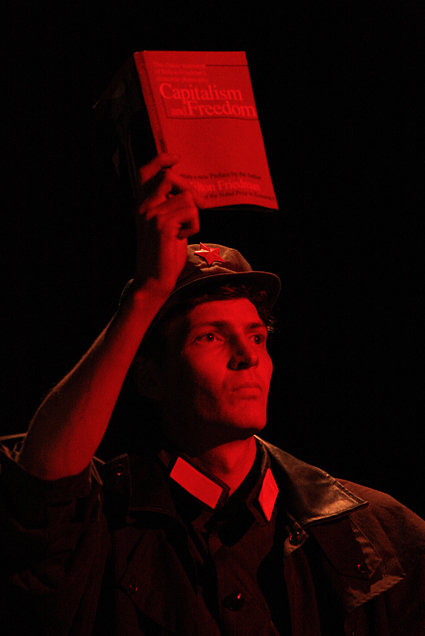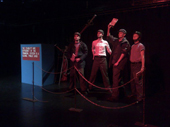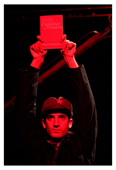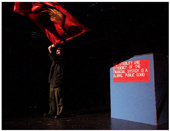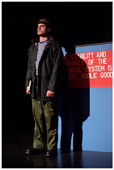Epic Sea Battle at Night: A Revolutionary Play Permeated with the Economic Thinking of Milton Friedman
THIS IS NOT A PERFORMANCE OR A LECTURE!, RADAR, Loughborough, 18.6.2011
Again, A Time Machine at the Showroom, London 5.7.2011
The play Epic Sea Battle at Night was originally staged in 1967, to commemorate two of China’s People’s Liberation Army’s military triumphs over the Taiwanese navy two years previously. Produced at the height of the Chinese Cultural Revolution, the play is an example of the exploitation of the arts as an ideological instrument, celebrating military heroism and political conviction. Stills from the play were included in, China Pictorial 11, an English language propaganda pamphlet that was distributed to Western Imperialists in order to educate them in Maoist policy. Today, these images are clear representations of ideology. More than forty years after the Cultural Revolution, the ideology under which we live, neo-liberal late-capitalism, deliberately shirks from such blatant displays of propaganda. We have supposedly the freedom to believe whatever we like in a post-ideological age, and yet core beliefs about meritocracy, individualism and competitiveness frequently go unchallenged.
By juxtaposing the visual language of ideology with the text of the capitalist manifesto, the re-enactment of a scene from Epic Sea Battle at Night harnesses the aesthetics of the past so as to allow us to reconsider the alleged neutrality of the present. The design of the stage, the positioning of the actors, costumes and props of the current production closely resembled those documented in China Pictorial 11, yet the actors’ monologues belong to a completely different context. No less heroic and utopian in tone than the speech given by the political instructor of gunboat 874 in the original play, the capitalist manifesto was an attempt to give a concrete language to the shapeless ideology of the present, and to force the invisible currents that govern life today, in China as in the West, to the surface. Neither a lecture on neo-liberal economics, nor a theatrical performance of a narrative, the piece appropriated the format of the propaganda play to re-evaluate the relationship between art and politics now.
